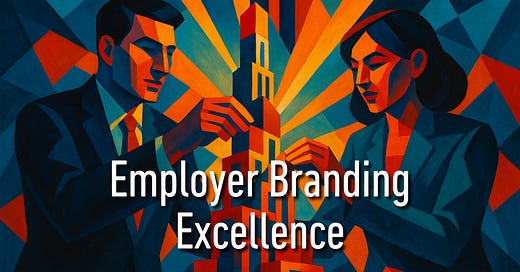12 years into this business and I see we’re still talking about the same things, having the same fights, and complaining about the same challenges today as when I started.
One might be tempted to think employer branding as a function or idea hasn’t evolved and grown at all. Groundhog Day, but without the hope of an early spring.
And that’s not the case. While there are a million ways to “do” employer branding, I suspect that what holds us back is that we do not have a shared north star, an idea of what excellent employer branding looks like.
You cannot hit what you cannot envision. You can’t be it if you can’t see it.
So here are my thoughts on what excellent employer branding requires.
Employer Branding is Insightful
You can’t build great branding until you have a rock-solid understanding of how the company, team or role is different. That insight drives all the decisions that communicate credibly how this company could be the best choice for some candidates (and the worst choice for many others). Insight takes work, demands that you ask more and harder questions to get to something worth building on.
Employer Branding is Disciplined
Great employer branding is visible within every candidate touchpoint, and influences every recruiting decision, from what channels to use to what questions to ask. It doesn’t live in silos, but it requires work to embed it everywhere, especially in places where you weren’t necessarily invited.
Employer Branding is Empathetic
A great employer brand isn’t built around what candidates want. Instead, it works to understand the target candidate and makes it clear what’s being offered and why the candidate might value it. And it thinks deeply on the deeper meaning on why the candidate wants that and how it will impact them. It brings what you offer and ties it to their own wants and desires.
Employer Branding is Inclusive
Employer branding sees no color, no gender, no religion and no handicap. It sees the value in people, in their experience, in their passion, and in their creativity and connects it to the company. More specifically, employer branding reveals the value it can bring out of the right people.
Employer Branding is Expansive
Employer branding that stays in the TA box is relegated to making a minor impact and playing a small role. The brands that play with comms, marketing, the business, and anyone else who will listen, who serve the needs of those teams will unlock their magic will change companies.
Employer Branding is Patient
While an employer brand creates value as soon as it is used, it takes time for it to extend to all roles, all teams, all functions, all offices, influencing thinking from the COO and CFO to marketing to internal comms, to HR, thus evolving into the form that creates maximum value. Time is part of the equation for your success.
Employer Branding is Opportunistic
If we had all the resources we needed, we could build out detailed blueprints for our grand plans. But of course, that will never happen. Instead, we learn to listen for opportunities to influence influencers, and create the tiny bits of magic that inspire others to want to work with us. Sometimes our biggest wins will be from places we never considered.
Employer Branding is Focused
You can’t build “amazing” until you learn to say no to a million “pretty good” ideas, because you’ll see a lot of those, often from people it’s hard to say “no” to. Define your strategy as a filter of good ideas, letting only the great stuff through.
Employer Branding is Restless
Every day, assume nothing works and you’re ready to build from a clean sheet of paper. You really don’t, but that mentality opens doors and opportunities to do amazing work without dragging the baggage of last week’s decisions with you.
Employer brand excellence doesn’t happen by following a recipe or formula. And it looks different from company to company. But that means it’s your chance to think bigger and achieve more.
The industry (and your company) is counting on you.
-James
p.s. I might be able to help you build/communicate your brand





James, love what you're saying here. These virtues are clarifying. I like your recommendations for opportunism and restlessness. On the inclusivity part, I wonder how you'd respond to a criticism like, "Not seeing color or gender or religion sounds like a kind of cultural blindness." Do you think that sort of, um, neutrality is valuable? Or do you think there might be some value in seeing the particulars of different identities? Thanks for your work!